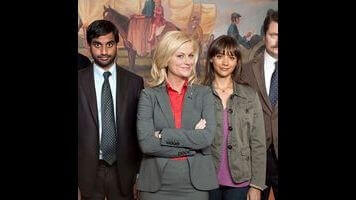Parks And Recreation: “2017”/“Ron And Jammy”

As Parks And Recreation begins its abbreviated final season, the last big question before it is what, if anything, its ending could look like. This show may have long since lost the fastball that made it an ace and transitioned into the crafty lefty phase of its career—for those unfamiliar with casual baseball analogies, the good people at the law firm of Fwar, Dips, Winshares Gritt, Babip, Pecota, and Eckstein will be happy to explain, billable by the hour—but this remains a fundamentally solid show, regardless of which half of the 2010s it now takes place in. The trouble is that, while Parks And Recreation has never sunk to the same kind of depths as it spiritual predecessor The Office did at its nadir, it also lacks the kind of big driving plotlines that The Office was able to pull from in Steve Carell’s final season or the show’s own last year. The Office was a workplace comedy that drew its narrative lifeblood from the characters’ relationships and their search for fulfillment, whereas Parks And Recreation has generally been far more about the work itself. This is a show defined by its big projects: There’s a reason the Harvest Festival plotline remains the show’s finest hour(s).
That’s not to say Parks And Recreation doesn’t care about its characters’ inner lives; hell, there may not be a show on the air that more unabashedly roots for its characters to succeed. But that’s kind of the point, particularly in the post-Ann version of the show. Ever since Leslie and Ben got together, everyone’s life has more or less been on the right track, and it’s just harder for the show to sell audiences on the notion that not everything is going to work out okay sooner or later. That’s not necessarily for lack of trying. After all, tonight’s premiere episode, “2017,” does theoretically set up a longstanding feud between Ron and Leslie, one bad enough to destroy their friendship and keep them on non-speaking terms for two full years. For a character-driven show, such a rift between its two most important characters really ought to provide a driving force for the season. Yet if you asked me to describe what “2017” sets up as the final season’s last overarching plotline, I’d say it’s Leslie’s quest to get the Newport land and turn into a national park. And that isn’t just because this has always been a show made by and for people who care less about feelings than they do sound land management.
No, the real reason that Leslie and Ron’s conflict feels like a non-starter is that there’s really no doubt, based on everything we’ve ever seen of Parks And Recreation, that the two are going to make their peace. In fairness, it might be unrealistic to expect genuine uncertainty on that point, as even comedies far more mean-spirited than this would almost certainly have their main characters reconcile before the final bow. But then, look at “Ron And Jammy”: For that episode to work, Leslie and Ron need to be on the same side, and so a truce is declared without fuss or delay. Hell, there’s no obvious way to differentiate how Ron and Leslie interact under truce conditions here than they would have if the show had done this in season three or season five. Perhaps the show’s goals here are genuinely more narrowly focused than “2017” initially suggests, as “Ron And Jammy” does appear to suggest that Ron and Leslie’s continued dispute is more professional than personal. Or perhaps, even when the time jump gives the show a chance to shake things up, Parks And Recreation is hesitant to veer from the formula that got it to seven seasons in the first place.
And, honestly, that’s fine, if a tad disappointing for those (myself included) who were hoping the move to 2017 would more fully snap the show out of its status quo. Leslie is the character least changed by the shift in years and circumstances, but at least she’s a bit more self-aware about it than we’ve seen in previous seasons. As she observes in “Ron And Jammy” while assessing the situation, “I have a lot to gain by being right and I have severe tunnel vision about achieving my goals.” Besides, the real question with Leslie as the protagonist of a comedy is how much her reconfigured role puts her in a position to be funny. Her squabbling with Ron in “2017” isn’t bad, suffering mostly from overfamiliarity. On the other hand, I’m not going to object to Ron and Leslie conveniently forgetting their feud whenever the plot demands if it allows for more scenes like those in which the pair deprogram the Tammy-fied Jeremy Jamm. It’s hard to describe just how immensely satisfying it is to watch—and listen, my goodness!—to Leslie deliver hard slap after hard slap, and that’s before we even get to Amy Poehler’s delightfully uncanny Megan Mullally impression. This too isn’t exactly a new scenario for Leslie—a title like “Ron And Jammy” signals we’ve been down this road before—but Leslie tends to be at her most comically effective when she gets to play the relatively sane straight woman, going to absurd but entirely justified lengths to protect people against Pawnee’s far greater crazies.
 Keep scrolling for more great stories.
Keep scrolling for more great stories.
